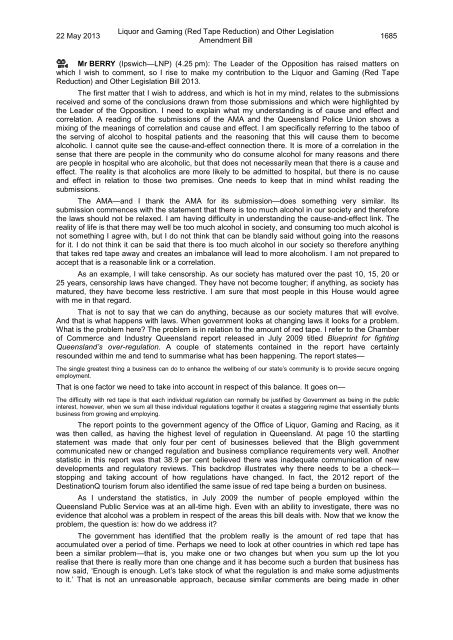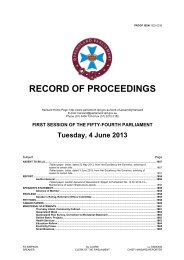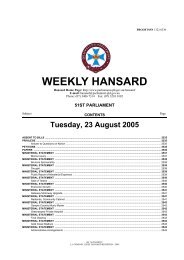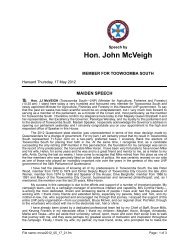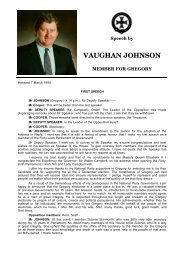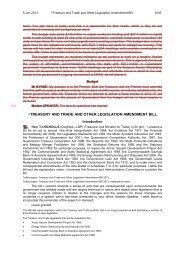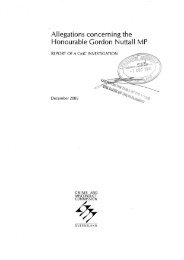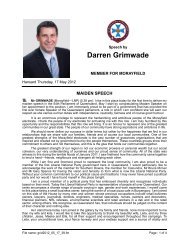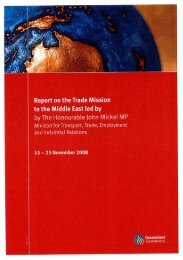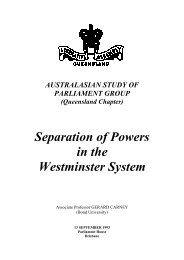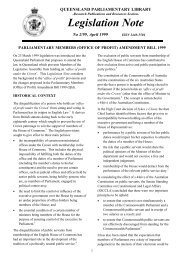RECORD OF PROCEEDINGS - Queensland Parliament ...
RECORD OF PROCEEDINGS - Queensland Parliament ...
RECORD OF PROCEEDINGS - Queensland Parliament ...
Create successful ePaper yourself
Turn your PDF publications into a flip-book with our unique Google optimized e-Paper software.
22 May 2013<br />
Liquor and Gaming (Red Tape Reduction) and Other Legislation<br />
Amendment Bill<br />
1685<br />
Mr BERRY (Ipswich—LNP) (4.25 pm): The Leader of the Opposition has raised matters on<br />
which I wish to comment, so I rise to make my contribution to the Liquor and Gaming (Red Tape<br />
Reduction) and Other Legislation Bill 2013.<br />
The first matter that I wish to address, and which is hot in my mind, relates to the submissions<br />
received and some of the conclusions drawn from those submissions and which were highlighted by<br />
the Leader of the Opposition. I need to explain what my understanding is of cause and effect and<br />
correlation. A reading of the submissions of the AMA and the <strong>Queensland</strong> Police Union shows a<br />
mixing of the meanings of correlation and cause and effect. I am specifically referring to the taboo of<br />
the serving of alcohol to hospital patients and the reasoning that this will cause them to become<br />
alcoholic. I cannot quite see the cause-and-effect connection there. It is more of a correlation in the<br />
sense that there are people in the community who do consume alcohol for many reasons and there<br />
are people in hospital who are alcoholic, but that does not necessarily mean that there is a cause and<br />
effect. The reality is that alcoholics are more likely to be admitted to hospital, but there is no cause<br />
and effect in relation to those two premises. One needs to keep that in mind whilst reading the<br />
submissions.<br />
The AMA—and I thank the AMA for its submission—does something very similar. Its<br />
submission commences with the statement that there is too much alcohol in our society and therefore<br />
the laws should not be relaxed. I am having difficulty in understanding the cause-and-effect link. The<br />
reality of life is that there may well be too much alcohol in society, and consuming too much alcohol is<br />
not something I agree with, but I do not think that can be blandly said without going into the reasons<br />
for it. I do not think it can be said that there is too much alcohol in our society so therefore anything<br />
that takes red tape away and creates an imbalance will lead to more alcoholism. I am not prepared to<br />
accept that is a reasonable link or a correlation.<br />
As an example, I will take censorship. As our society has matured over the past 10, 15, 20 or<br />
25 years, censorship laws have changed. They have not become tougher; if anything, as society has<br />
matured, they have become less restrictive. I am sure that most people in this House would agree<br />
with me in that regard.<br />
That is not to say that we can do anything, because as our society matures that will evolve.<br />
And that is what happens with laws. When government looks at changing laws it looks for a problem.<br />
What is the problem here? The problem is in relation to the amount of red tape. I refer to the Chamber<br />
of Commerce and Industry <strong>Queensland</strong> report released in July 2009 titled Blueprint for fighting<br />
<strong>Queensland</strong>’s over-regulation. A couple of statements contained in the report have certainly<br />
resounded within me and tend to summarise what has been happening. The report states—<br />
The single greatest thing a business can do to enhance the wellbeing of our state’s community is to provide secure ongoing<br />
employment.<br />
That is one factor we need to take into account in respect of this balance. It goes on—<br />
The difficulty with red tape is that each individual regulation can normally be justified by Government as being in the public<br />
interest, however, when we sum all these individual regulations together it creates a staggering regime that essentially blunts<br />
business from growing and employing.<br />
The report points to the government agency of the Office of Liquor, Gaming and Racing, as it<br />
was then called, as having the highest level of regulation in <strong>Queensland</strong>. At page 10 the startling<br />
statement was made that only four per cent of businesses believed that the Bligh government<br />
communicated new or changed regulation and business compliance requirements very well. Another<br />
statistic in this report was that 38.9 per cent believed there was inadequate communication of new<br />
developments and regulatory reviews. This backdrop illustrates why there needs to be a check—<br />
stopping and taking account of how regulations have changed. In fact, the 2012 report of the<br />
DestinationQ tourism forum also identified the same issue of red tape being a burden on business.<br />
As I understand the statistics, in July 2009 the number of people employed within the<br />
<strong>Queensland</strong> Public Service was at an all-time high. Even with an ability to investigate, there was no<br />
evidence that alcohol was a problem in respect of the areas this bill deals with. Now that we know the<br />
problem, the question is: how do we address it?<br />
The government has identified that the problem really is the amount of red tape that has<br />
accumulated over a period of time. Perhaps we need to look at other countries in which red tape has<br />
been a similar problem—that is, you make one or two changes but when you sum up the lot you<br />
realise that there is really more than one change and it has become such a burden that business has<br />
now said, ‘Enough is enough. Let’s take stock of what the regulation is and make some adjustments<br />
to it.’ That is not an unreasonable approach, because similar comments are being made in other


